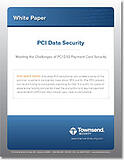Download Podcast: Securing Microsoft Windows Azure with Encryption & Key Management
|
Microsoft made a huge Windows Azure cloud announcement this June with their support for full Windows Server workloads including support for all major versions of SQL Server. Prior to the June announcement, Azure only supported Windows applications, and a simple database called SQL Azure. Now you can deploy full production Windows server instances to Azure. That is a really big change.
However, study after study shows that the number one concern of organizations moving to the cloud is security. And the number one security issue is protecting sensitive data. And the number one problem in the area of data protection is how to manage encryption keys.
By now most of you know that we have a strong partnership with Microsoft around SQL Server encryption. For months we’ve been helping customers protect SQL Server data using Alliance Key Manager, our encryption key manager. We cover every version and edition of SQL Server for encryption with NIST-certified encryption key management. Whether you are using SQL Server Enterprise Edition with Transparent Data Encryption (TDE), or SQL Server Standard or Web Editions without the TDE support, or even older versions of SQL Server – we have encryption and key management solutions that help you meet compliance regulations.
So it is natural that we are hearing a lot from Microsoft customers about securing data in Azure. But how does all of this work in the Azure environment?
The short answer is – it works in Azure just like it works everywhere else. Regardless of the Azure platform you are using, our encryption key manager protects the encryption keys that protect your data. You can run full SQL Server TDE in Azure, or you can run SQL Server Cell Level Encryption, or you can use our Windows .NET assembly to protect data in your .NET applications.
In the same way that we protect SQL Server data in traditional IT environments, we protect it in every Microsoft Azure environment, too. And that means we protect SharePoint 2010 and Dynamics, too, when they are deployed on top of SQL Server with TDE.
When you protect SQL Server with Alliance Key Manager, you can host the key server in your own data center, or you can install it at your own favorite hosting provider, or you can use a key server in our hosting center. The choice is yours.
Moving applications to the cloud involves many challenges. Exposing your data without proper encryption does not have to be one of them.
Patrick




 We've been tracking the growing need for encryption and key management to secure the mass of data that is (or soon will be) residing in the Cloud. To address this issue, a security group was recently formed that is completely focused on Cloud security. If you’ve not visited the Cloud Security Alliance web site, it is well worth a visit at www.cloudsecurityalliance.org.
We've been tracking the growing need for encryption and key management to secure the mass of data that is (or soon will be) residing in the Cloud. To address this issue, a security group was recently formed that is completely focused on Cloud security. If you’ve not visited the Cloud Security Alliance web site, it is well worth a visit at www.cloudsecurityalliance.org.